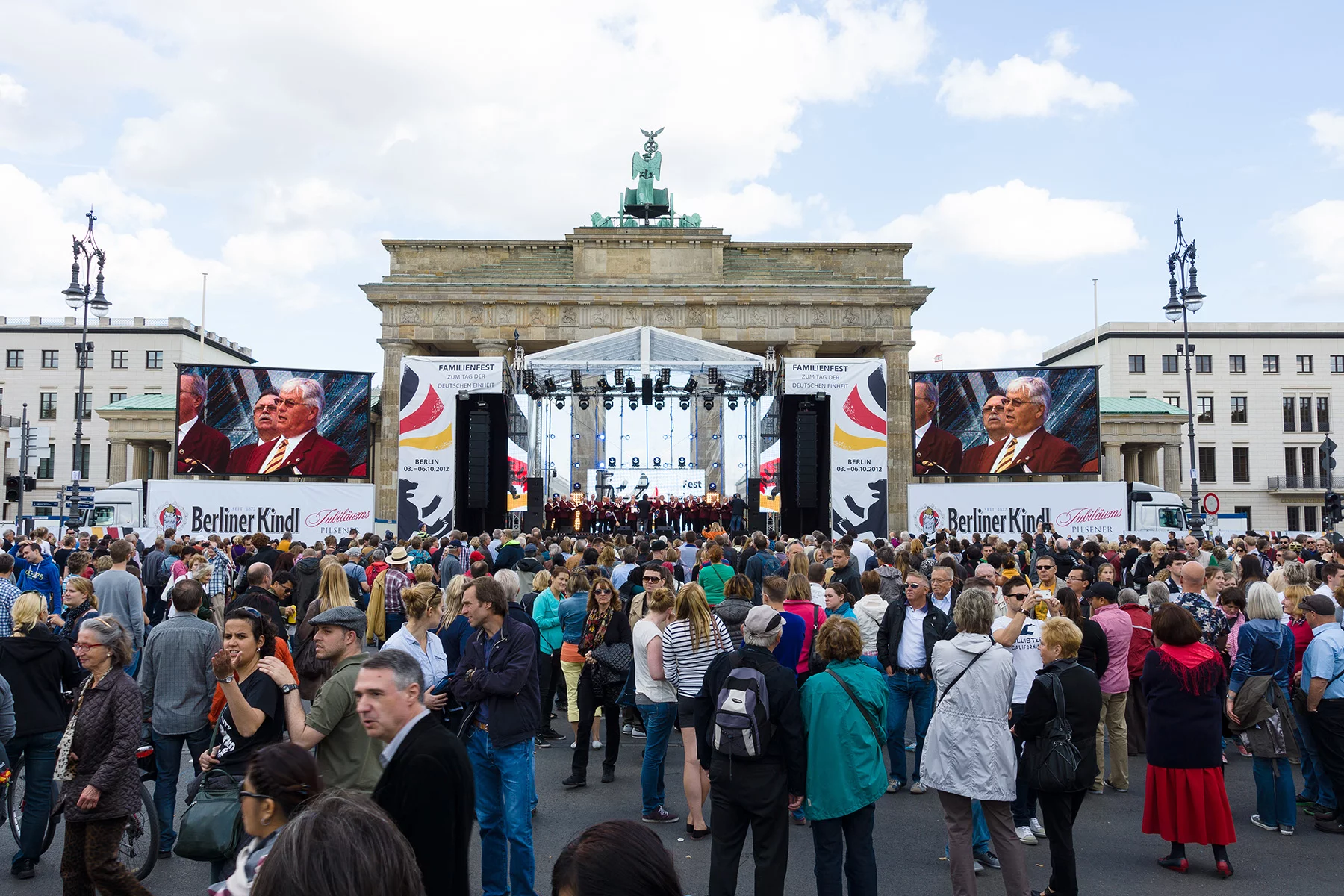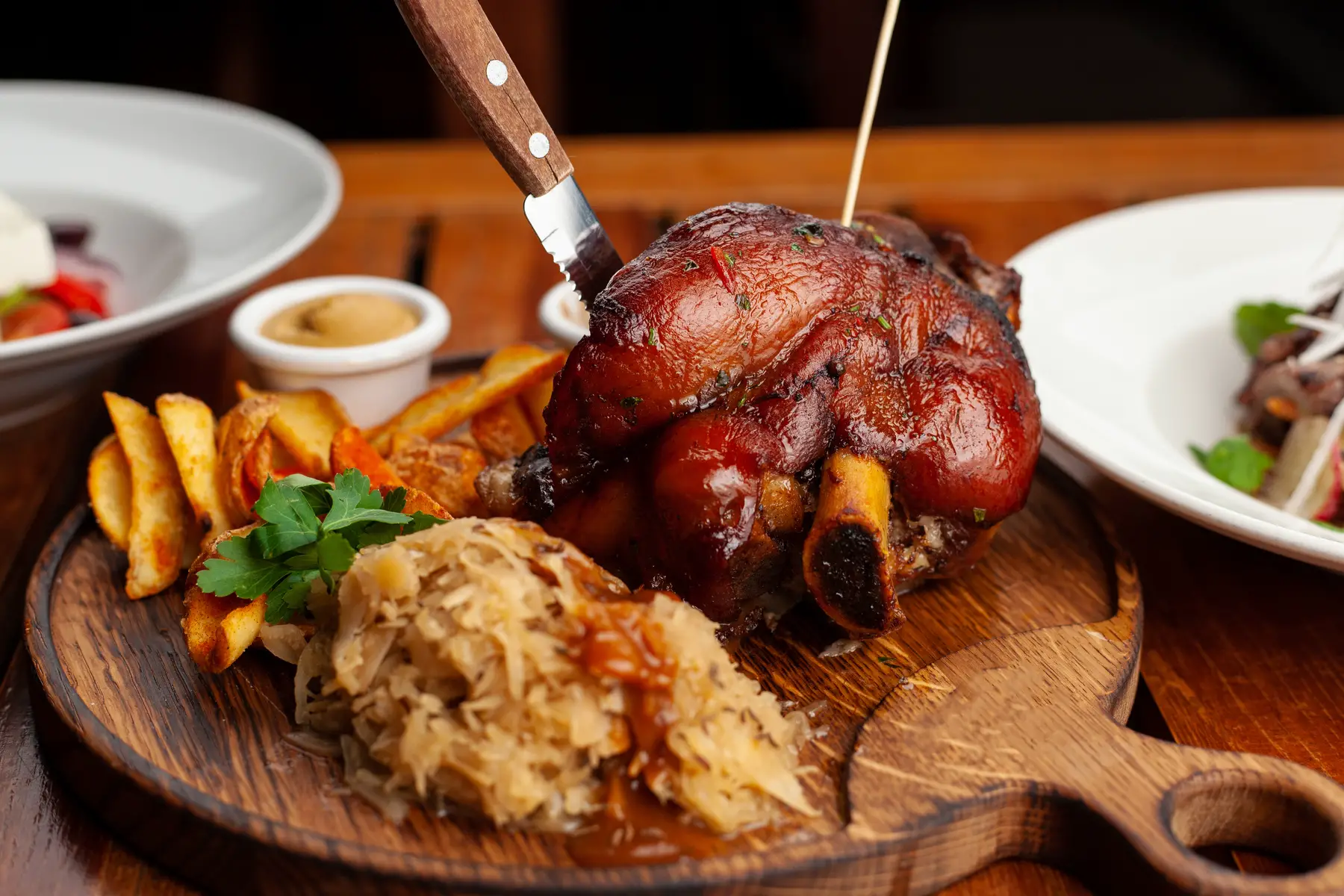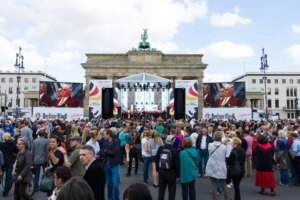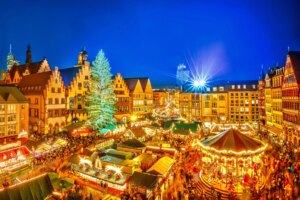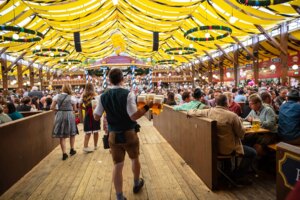From melting wax that predict your future to toasting with marzipan pigs for good luck, the Germans know how to make saying goodbye to the old year unforgettable. Add to that a feast of fondue, sparkling wine, and a midnight sky exploding with fireworks, and you’ve got a celebration you’ll want to be part of.
Here’s what you need to know about ringing in the New Year, German style:
Allianz Travel
If you’re planning to travel, make sure you’re covered for costs of cancellation and other interruptions with Allianz Travel. They offer a range of products, including travel insurance, incoming health insurance, and rental vehicle insurance. With 24/7 emergency contact available, Allianz Travel are there wherever you need them.
New Year’s Eve in Germany
When 31 December rolls around, Germany doesn’t just tiptoe into the New Year – it rockets in with a bang! On New Year’s Eve (Silvester), Germans trade their famously organized ways for unrestrained joy, fireworks, and a whole lot of fun.
Friends and families come together to enjoy good food, music, and laughter while they are eagerly counting down to midnight. When the clock strikes twelve, cheers and toasts flow freely, and the sky explodes in a spectacular display of fireworks.

Celebrations will often go on until 03:00–04:00 in the morning when the last firecrackers have been popped. New Year’s Day – 1 January – is a public holiday in Germany, one that’s often spent recovering from the festivities or catching up with family.
What are German New Year traditions?
Telling your fortune with lead
One of Germany’s most iconic New Year traditions is Bleigießen; fortune-telling by pouring lead. Basically, you melt a small piece of lead over a flame and pour it into cold water. The resulting shapes will predict your fortune for the year ahead. Got something heart-like? That could be love. A shape that vaguely resembles a boat? Maybe you’re heading off on an adventure.
Lead is now banned due to environmental concerns. Many will now predict the future through blobs of eco-friendly wax.
Dinner for One (comedy sketch)
Another German New Year tradition that might surprise you is watching the comedy sketch Dinner for One (Der 90. Geburtstag). This British black-and-white movie shows a rich elderly who invites four of her friends to her birthday dinner. Unfortunately, her friends have discorporated, and she asks her butler to cover for her absent guests and make toasts on their behalf.
Broadcast since 1963, the comedy sketch show is a staple on German TV. Every New Year’s Eve, millions tune in to laugh at Miss Sophie’s increasingly inebriated butler. Indeed, it’s so popular that the phrase “the same procedure as every year” (Die selbe Prozedur wie jedes Jahr James) has become part of the local vernacular.

Giving out lucky charms
Don’t be surprised if you see miniature pigs (Glücksschweinchen) or mushrooms (Glückspilze) showing up on New Year’s Eve. Family and friends often exchange these lucky charms as gifts, with the hope of bringing good luck and happiness to the year ahead.
Pigs and mushrooms are often seen as symbols of good fortune in Germany, and you’ll find them on greeting cards, table settings, and as little marzipan or chocolate treats. Sometimes, they’re paired with other lucky symbols, like chimney sweeps, horseshoes, four-leaf clovers, and ladybugs, to double down on the good fortune.
Massive fireworks displays
Every year, countries around the world ring in the New Year with lots of fireworks. But no one quite does it like the Germans.
As midnight approaches, the sky lights up with a cacophony of colors and sounds. These firework displays are launched not just by organized events but by individuals all over Germany. People go all out; it’s both exhilarating and slightly traumatic, but that’s all part of the charm.
Typical New Year food and drinks
Of course, food takes center stage in Germany’s New Year celebrations. Many families will prepare a whole carp; putting one of its scales or bones in your wallet will bring luck and money in the new year.
Others opt for traditional meals like raclette or fondue, where everyone gathers around to melt cheese and dip in bites like bread, veggies, and potatoes.

No Silvester feast is complete without a sweet treat, and Berliner Pfannkuchen or Krapfen are the stars of the dessert table. These doughnuts are typically filled with jam, but can also contain chocolate, vanilla, or Eierlikör (egg nog). Just be careful you don’t pick the prank doughnut filled with mustard.
To wash it all down, Bowle (punch) is the must-have party drink on New Year’s Eve. For something a little more dramatic, there’s Feuerzangenbowle, a spiced wine with a flaming sugar cone. Sekt (sparkling wine) is the go-to drink for the midnight toast.
How to say Happy New Year in German
There are plenty of ways to wish someone a Happy New Year in German. Here are a few expressions you’ll hear as 31 December rolls around:
- Alles Gute zum neuen Jahr! – a slightly casual phrase, meaning “All the best for the new year!”
- Frohes neues Jahr! – means “Happy New Year!”
- Guten Rutsch ins neue Jahr! – used in the days leading up to New Year’s Eve, this phrase literally translates to “A good slide into the New Year!”
- Prosit Neujahr! – if you’re raising a toast, your go-to phrase is “Cheers to the New Year!”
- Viel Glück im neuen Jahr! – for a more heartfelt wish, you can wish someone “Good luck in the New Year!”
Germans are big on exchanging New Year’s wishes, and it’s common to say “Frohes neues Jahr!” well into the first week of January. Some even extend it until 6 January (Epiphany). So, if you’re back at work or running errands after the holiday, remember to spread the good vibes for the year ahead.
Where to celebrate New Year in Germany
Whether you’re looking for massive street parties, dazzling fireworks, or something a little less crowded, Germany’s cities offer something for everyone.

Here are three German hotspots to kick off the New Year in style:
New Year in Berlin
Berlin pulls out all the stops for New Year’s Eve, hosting one of Europe’s largest open-air celebrations at the iconic Brandenburg Gate. Expect live music, DJs, food stalls, and a crowd ready to party their way into the New Year.
As midnight approaches, the excitement builds, culminating in an awe-inspiring fireworks display that lights up the city skyline. For a more relaxed vibe, head to one of Berlin’s rooftop bars to toast the New Year with a panoramic view.
Local expert
Michele Carloni
Insider tip
Places like Alexanderplatz and Brandenburg Gate can get super crowded. If you’d like to make sure you have a spot, go there early in the evening.
New Year in Hamburg
For a truly unique New Year’s experience, Hamburg’s harbor is the place to be. The combination of shimmering water, illuminated ships, and a spectacular fireworks display creates a truly magical atmosphere.
The city’s party center is around St. Pauli and the Reeperbahn, which offers everything from lively bars to all-night clubs. If you prefer something quieter, hop aboard a harbor cruise to see the fireworks from the water. This is bound to give you a night to remember.

New Year in Munich
In Munich, New Year’s Eve blends tradition and glamour. The central square, Marienplatz, becomes a buzzing hub of activity where locals and tourists gather to celebrate.
At midnight, the city’s historic architecture provides a stunning backdrop to the fireworks, making it an unforgettable experience. After the show, many head to local beer halls or chic restaurants to continue the festivities with Bavarian delicacies and a glass of sparkling Sekt.
New Year’s Day in Germany
New Year’s Day (Neujahrstag) in Germany is a time to slow down, recharge, and ease into the year ahead. Streets that were bustling just hours ago now feel peaceful – a sharp contrast to the excitement of Silvester. Most people will spend 1 January (Ruhetag) quietly at home, recovering from the celebrations of the night before or enjoying a comforting meal with family.
Some also use this day to dive headfirst into their goals with characteristic determination. New Year’s resolutions are quite popular in Germany, particularly those that focus on health, fitness, and efficiency. Indeed, gym memberships, wellness plans, and attempts to tackle procrastination tend to peak in January and trail off by April at the latest.
While New Year’s Day might be quiet, it’s just the calm before the next wave of celebrations begins. In some regions, the holiday season flows seamlessly into Carnival preparations, especially in areas like Cologne, Düsseldorf, and Mainz. Known locally as Karneval or Fasching, this pre-Lenten festival is a whirlwind of parades, costumes, and celebrations that kick off in earnest later in the winter.
Practical tips for expats
New Year’s in Germany is a great experience, but if you’re new to the country, a little preparation goes a long way. Here are some tips to help you celebrate in a fun, safe, and stress-free way:
- Bundle up – New Year’s Eve in Germany typically falls in the middle of winter, so expect cold temperatures. Be sure to dress in layers, wear sturdy shoes, and bring a warm jacket, especially if you’re celebrating outside.
- Stay safe during fireworks – when it comes to fireworks, it can feel like a free-for-all. People set off rockets, sparklers, and firecrackers in parks, backyards, and sometimes even in the middle of the road. Keep a safe distance and watch your surroundings, especially in busy areas. If you’re not into the chaos, consider watching from a safe vantage point, like a rooftop or balcony. And for those who have pets, it might be wise to look into anxiety medication.
- Plan ahead for public transport – public transport usually runs longer on New Year’s Eve to accommodate late-night revelers. That said, trains and buses often stop running by the early hours of 1 January, so check your local transport app and plan ahead if you need to get home. If you’re in a larger city, don’t expect to hail a taxi easily – it’s a busy night for everyone.
- Businesses are closed on 1 January – many stores, including supermarkets and restaurants, will be closed on 1 January, especially outside major cities. If you’re in need of essentials like breakfast or coffee, make sure you stock up beforehand.
- Mind the recycling rules – after the party has cleared, you’ll notice that cleaning up is taken seriously. Germans are meticulous about recycling, so be sure to sort your empty bottles, cans, and leftover packaging into the appropriate garbage cans.


